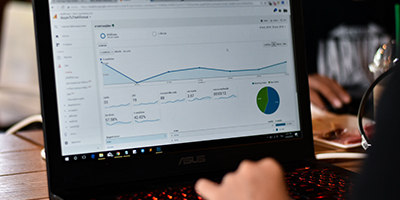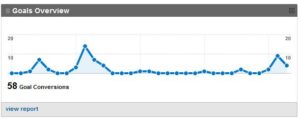This is the final part of our five part series about Google Analytics. In this article we’ll discuss the most important section of all, goals! Goals can be set up to track a variety of different “accomplishments” on a website. Typically you’d want to set up a goal to track when someone completes your ‘contact us’ form. This is definitely the most common goal used. In this instance one completed goal equals one conversion (or lead). You should make sure that your dashboard includes goal conversions so that you can easily track them.
Google Analytics gives you three ways to set up goal tracking. The first is through a “url destination.” This is how you would set up conversion tracking for someone who fills out your contact page. You would need to set up a “thank you” page that automatically comes up after someone submits a form. The url of this thank you page is used to track this particular goal.
You can also set up a goal for “time on site.” If you wanted to implement this goal you’d set the time limit and anyone who stays on the site longer than the limit is considered a goal conversion. The other goal that you can set up is “pages/visit” which allows you to track goals for every instance that someone lands on a specific page of your website, such as your “About Us” page.
In most instances I would recommend only using the “url destination” goal tracking. If you have more than one form on your website then you’d want to track them as separate goals. For instance, on the TRBO ADvance website we have two goals set up. The first is for tracking people who fill out our free report opt-in, which is found on our home page and in other places on our website. The other is for our ‘contact us’ inquiries. Having two goals allows us to see which opt-in is generating more conversions, so that we can make adjustments if needed.
It is important to know that you can track goals from many places on the website, and not just the dashboard or ‘Goals’ section. For instance, in ‘Traffic Sources’ you can actually narrow down which source (Direct, Referral or Search Engine) resulted in more conversions. You can dig even deeper to see exactly which keywords people searched for organically on Google led to a conversion. This is very powerful, as it can tell you if your SEO efforts (and your high search engine rankings) are leading to new leads.
If you have any questions about setting up goals on Google Analytics then you can contact TRBO ADvance today or call 877-673-7096 x708.






